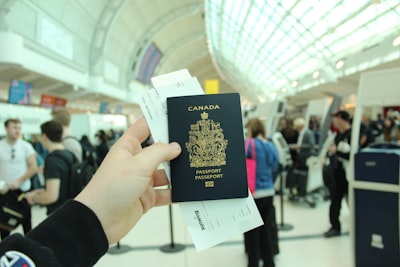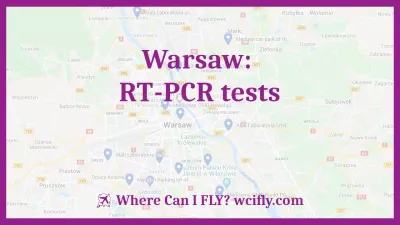Where Can I Fly Without A Passport?
- Passport and plane ticket
- If your passport is lost or stolen:
- What if you accidentally tore off part of one of the pages of your passport? Will they be allowed on the plane?
- What if the document is expired?
- Can foreigners in Poland travel to other EU countries?
- Recommendations from the Ministry of Foreign Affairs of Poland
- Travel to work in other countries
- Departure home
- Travel to other EU / Schengen countries
- Holders of extended visas, visa-free travel and residence cards
- Staying on a stamp while waiting for a card to stay
- How can a traveler from Russia get to the closed countries of Europe
- Which EU and Schengen countries are open to Russians
- Through which countries do Russians get to Europe
- Austria.
- Hungary
- Greece
- Romania.
- Croatia
- Which closed countries do Russians go to?
- Spain.
- France.
- Frequently Asked Questions
Have you lost your passport just before an important flight? Don't panic! Let's figure it out. First, we will find out if it is possible to board a plane without an identity document - without a passport.
Passport and plane ticket
The legislature foresaw this situation and made it possible to fly without a passport. This should be taken care of a couple of days before the trip. To get a certificate of the loss of the document (which will be considered the basis for believing you at the airport), you need to go to the police station, not forgetting to take printed plane tickets with you. There you will be asked to write a statement about the loss of your passport and you will be given the certificate itself, which is certified by the competent authorities. After visiting the police, contact the airline by phone and explain the situation. When checking in for the flight, provide the full package of documents that the police have issued to you.
It is logical to assume that if your passport is snatched out already at the airport, you will not be able to board the plane (because you will not have time to write an application). But if you lost your passport before traveling abroad, then you will not be able to fly away.
If your passport is lost or stolen:
Contact the passport office at the place of registration. There you will write a statement (Important! Indicate there a request to cancel the stolen document so that no one can use it) and you will be given a notification. With this coupon, you need to go to the police, where you will be given a temporary passport.
What if you accidentally tore off part of one of the pages of your passport? Will they be allowed on the plane?
Do not worry: if you can see all the necessary information, your passport will be accepted when you check-in for the flight. If the information is unreadable, and there are no photocopies on hand, then you will be denied boarding.
What if the document is expired?
It's more complicated here. After the expiration of the document, it is considered invalid, which means that you do not have a passport at the moment. You will not be allowed on board, so it is worth taking care of such things in advance and, if the deadline is coming to an end, it is better to double-check and take the necessary measures in advance.
Can foreigners in Poland travel to other EU countries?
It will be primarily about leaving Poland. The information presented below is relevant for foreigners staying in the Republic of Poland on various grounds, however, the rules for entering and staying in other countries (where you plan to leave) are governed by their own rules and laws.
Recommendations from the Ministry of Foreign Affairs of Poland
Of all the official rules in force at the moment, there is only a joint recommendation from the Ministry of Foreign Affairs of Poland and the Main Sanitary Inspectorate to refrain from traveling abroad if it is not necessary.
It is also advised to take into account the possibility of limiting flights, the need to comply with anti-epidemiological requirements. Accordingly, at the moment there are no direct prohibitions to leave Poland in any direction. Restrictions can be imposed on specific checkpoints, flights, as well as individual rules of the country of the desired entry.
Travel to work in other countries
This issue stands apart, but since it is associated with the departure of foreigners from Poland, it should be said that some reasons for staying in the Republic of Poland allow you to visit other countries of the Schengen zone, but exclusively for purposes not related to work (with the receipt of income in general).
For business trips, a separate Van Der Elst visa mechanism is used, and then only in countries using this tool. There is also the possibility of short-term mobility, but it is realizable only within the framework of one enterprise, which has representative offices in different countries, and requires special registration (mainly used for company management and internships).
Departure home
All of the above does not apply to the state of which the foreigner is a citizen - you can always go home, except in cases of restriction of such a right through a court (for example, cases of imprisonment). Moreover, this applies to all of the following cases.
It is very important to understand that the return to Poland after such a departure depends on the existing grounds:
- The current visa-free regime, visas or cards - within the framework of these grounds, re-entry is possible;
- Extension of visa and residence card - you can return;
- Extension of visa-free - after leaving, you will be able to return only after obtaining a visa, or after the restoration of a new period of the visa-free regime (after 90 days);
- Stay on the stamp (pending a decision on the stay card). Departure is acceptable, but there may be problems with the return.
In all cases where return to Poland is possible, it is necessary to confirm the existence of the right to stay valid during COVID-19 (work, study, certain status, etc.).
Travel to other EU / Schengen countries
Visa-free stays, all types of visas, and residence cards that are within the terms indicated on them (for “visa-free” - within a 90-day stay) allow a “non-commercial” stay in other Schengen countries for up to 90 days in half a year.
Holders of extended visas, visa-free travel and residence cards
According to these types of documents, you can only stay on the territory of Poland, or travel to your homeland on the above conditions.
Staying on extended grounds in other countries, incl. Schengen area would be a violation of the rules of stay, with all the ensuing consequences, including deportation and a possible ban on entry to all EU countries. In this case, it will not be possible to return to Poland either.
At the same time, the presence of an extended visa or card does not deprive a person of other existing rights to stay in a particular country. For example, if you have an extended visa that allows you to stay only in Poland, but a foreigner has an unspent visa-free stay in the Schengen area, or reasons for staying in a third country, he has every opportunity to make such a trip (unless prohibited by the rules of the selected country). At the same time, an extended visa will give the right to return to Poland.
Staying on a stamp while waiting for a card to stay
A stamp in the passport, confirming that the documents for the residence card have been accepted, allows you to stay exclusively in Poland. In all respects, this case is similar to the extended basis, except that such a rule always exists, and the instrument for extending visas (visa-free, cards) was introduced temporarily for the duration of the pandemic.
Do not forget that being on the stamp after the end of the visa (if it was before) spends days of short-term stay (Schengen visa, visa-free regime). Accordingly, with a long stay (over 90 days) pending a decision on the card, a trip, for example, on a visa-free trip to the Schengen countries may be unavailable.
How can a traveler from Russia get to the closed countries of Europe
Most of the EU and Schengen states are now closed to travelers flying out of Russia.
You can fly to some European countries, for example, Finland, France and Spain, if you have been vaccinated with foreign vaccines. If there is no vaccination certificate, they will be put on the plane only for a good reason, such as work and study abroad. But this will have to be confirmed by documents.
Nevertheless, Russians regularly tell on social networks and on forums that they have rested in closed European states without any certificates. To get there, they include in the route an intermediate European country that receives Russians.
Which EU and Schengen countries are open to Russians
In October 2021, the borders of Austria, Bulgaria, Hungary, Greece, Cyprus, Portuguese Madeira, Romania, Slovenia, Croatia, Estonia are open for Russians. Bulgaria, Cyprus, Romania and Croatia are not part of the Schengen area, but they can be entered with a multiple-entry Schengen visa. Russians come to these countries, then from them to go to the closed states of Europe.
There are no direct flights to Madeira and Estonia from Russia: you can get there with a transfer, but then you get two connections in the route - not convenient and expensive.
It is also impossible to get to Estonia by land: the land border of Russia is closed for tourists. You can leave the country by car, bus or train only to Abkhazia, South Ossetia and by train to Belarus. They also release from the country those who have a valid reason - a residence permit or documents about the upcoming treatment.
Through which countries do Russians get to Europe
Typically, travelers from Russia enter closed countries via Austria, Hungary, Greece, Romania and Croatia.
Austria.
A special form must be completed within 72 hours of arrival. When checking in for a flight and at the border, you must show one of the documents:
- vaccination certificate approved by WHO or EU, domestic vaccinations are not suitable;
- PCR test not older than 72 hours or antigen test not older than 48 hours;
- a certificate of the transferred disease for the last six months. Instead, they will accept a certificate of the presence of antibodies, it is valid for 90 days. The vaccinated are exempted from quarantine, all others are required to self-isolate for 10 days. It can be interrupted early if the tests are done on the fifth day.
Hungary
Hungary lets vaccinated Russians in and recognizes all our vaccines. You can enter without vaccination, but with a PCR test - they require an analysis within 72 hours before arrival. An alternative to vaccination is a certificate stating that the tourist has suffered a coronavirus. Together with her, you will have to show a positive PCR test result obtained during an illness, and a negative one after recovery.
Greece
Greece expects from tourists a completed form 24 hours before entry and one of the tests: PCR not older than 72 hours or antigen not older than 48 hours. But in Europe, antigen test results are only accepted from certain manufacturers. Upon arrival, unvaccinated travelers take another test at the airport.
Romania.
To get into the country, Russians have three options:
- a) Get vaccinated with any Russian vaccine at least ten days before arrival;
- b) Take with you a certificate stating that you have been ill for a maximum of half a year before the trip;
- c) Make a PCR test within 72 hours before crossing the border. But if you stay in the country for more than 3 days, from the fourth day of your stay you will have to spend two weeks in quarantine.
Croatia
Croatia will require tourists to submit a completed form and one of the documents:
- PCR or antigen test. An antigen test result will only be accepted from a specific manufacturer;
- vaccination certificate, valid for a year, Sputnik V is suitable;
- confirmation that the tourist has recovered from the coronavirus over the past year.
Which closed countries do Russians go to?
Judging by the numerous messages on various forums, such countries as Spain, Italy, France are popular among Russians. How to enter them?
Spain.
Travelers are allowed to enter the country from Russia directly without restrictions, only if they have a certificate of vaccination with one of the WHO-approved drugs: AstraZeneca, Johnson & Johnson, Moderna, Pfizer, Sinopharm, Sinovac. If there is no certificate, entry from Russia is allowed only to those who have a valid reason to visit the country, for example, study or residence permit. The right to enter must be confirmed by documents. Spain divides other countries into three categories: green, yellow, red. In green countries, the situation is favorable, in yellow countries there are regions with a risk of morbidity, but there are no regions, in red ones there is a high risk of morbidity. When entering from the green zone of the EU or Schengen, no documents are asked. If the EU or Schengen country is in the yellow or red zone, then the traveler must show one of the documents when entering Spain: a certificate of the transferred coronavirus, a certificate of vaccination with a drug approved in Spain or the result of a coronavirus test. If a country is not part of the European Union or the Schengen area, additional restrictions may apply to it. To find out about them, you need to go to the website of the Spanish Ministry of Health.
France.
This country accepts tourists from Russia without restrictions only if they have a certificate of vaccination with AstraZeneca, Johnson & Johnson, Moderna or Pfizer. At the border, you need to show proof of vaccination and a completed questionnaire stating that you do not have symptoms of COVID-19 and you have not come into contact with the infected. Just like in Spain, in France there is a division of countries into zones. People enter France from the green zone with one of the documents: PCR or antigen test, a certificate of recovery for the last six months or a vaccination certificate issued after vaccination with a drug approved by the European Union. Tourists will be allowed from the orange and red zones only with a vaccination certificate. And the unvaccinated - only for a good reason, like studying.
Frequently Asked Questions
- Where can I fly without a passport or am I doomed without a passport?
- Don't worry and don't despair right away. Without a passport, you can fly wherever you need, but there are some peculiarities. Read the article carefully and move on.
- What are some destinations where travelers can fly without needing a passport, particularly for residents of certain countries?
- Residents of some countries can fly domestically or to certain neighboring countries without a passport. For example, U.S. citizens can fly to U.S. territories like Puerto Rico and the U.S. Virgin Islands without a passport.



